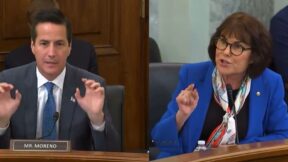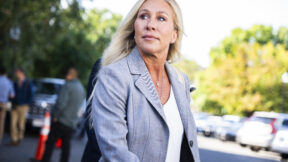WATCH: Alisyn Camerota Grills Facebook Exec Over Instagram Being Toxic for Teen Girls After Whistleblower Testimony
CNN’s Alisyn Camerota repeatedly grilled a Facebook executive on Tuesday after stunning testimony from company whistleblower Frances Haugen.
Monica Bickert, Facebook VP for content policy, joined Camerota after Haugen blasted the company and Mark Zuckerberg in particular for prioritizing profit over safety. She accuses the company of not doing enough to address misinformation and extremism on the platform before January 6th.
One revelation that has gotten a lot of attention is leaked internal research from Facebook showing the company is aware of just how toxic Instagram is for young girls.
Camerota pressed Bickert on January 6 and whether Facebook will be more transparent, but she particularly grilled her over the Instagram revelation.
Bickert said that “there have been a lot of mischaracterizations” about what all the leaked internal research says.
Camerota jumped in to clarify exactly what part she’s denying. “You don’t push out inflammatory controversial content because you know that heightens engagement?”
“We do the opposite,” Bickert claimed. “If you look in our transparency center, you can actually see that we demote, meaning we reduce the visibility, of engagement bait, clickbait.”
She said they work to give all users a good experience, but Camerota jumped in to ask, “Do you deny that teenage girls are not having a good experience on Instagram?”
“The majority of young people on Instagram are having a good experience and that is borne out by the documents that were stolen, including the Instagram youth survey of about 40 Instagram users,” Bickert said. “These were teens who were already struggling with mental health issues and on all of the issues, the majority of boys and girls said that Instagram either makes things better or doesn’t have a material impact on their experience.”
The research obtained by The Wall Street Journal showed that among teen girls in the United States, 20 percent feel somewhat worse or much worse after using Instagram. 43 percent said it had no effect, and 37 percent said they felt either somewhat better or much better.
Another data point showed that many teens who struggle with mental health say Instagram makes them feel worse, citing things like “pressure to match the money and body shapes of influencers” and “inappropriate advertisements targeted to vulnerable groups.”
Camerota asked, “You’re saying you do not have internal research that shows that depression and suicidal thoughts go up for teenage girls, as do thoughts of eating disorders?”
Bickert said this was “a very small survey” and claimed it’s been “mischaracterized.”
“On the 12 issues for these teens who are already struggling with mental health issues… the majority of them said Instagram makes things better or it doesn’t have material impact,” she added.
Camerota asked about the minority of teen girls who do feel worse, some even drawn to suicidal thoughts.
“I spent my career as a criminal prosecutor,” Bickert responded, “and worked a lot on child safety so even one teenager having a bad experience on Instagram is too many, and I can tell you that the hundreds of people at Facebook who actually do work on child safety — this former employee does not, did not.”
You can watch the full interview above, via CNN.




